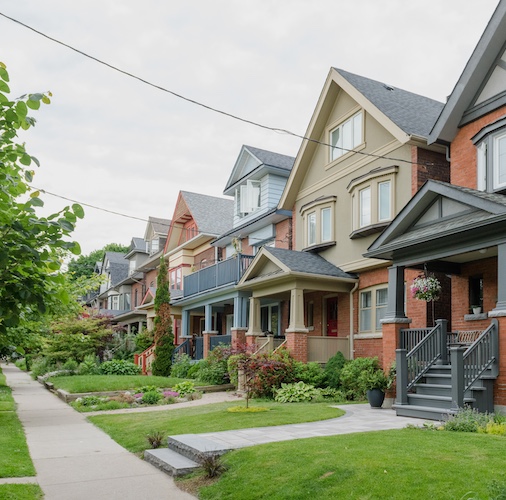A guide to first-time home buyer programs, loans and grants
Contributed by Sarah Henseler
Feb 8, 2026
•8-minute read

Effective November 16, 2025, both Fannie Mae and Freddie Mac are removing the minimum credit score requirement from their conventional loan eligibility guidelines. Loan approval will instead be based on an evaluation of overall credit risk factors.
For many first-time buyers, one of the biggest barriers to becoming a homeowner is saving up enough money to cover a down payment and closing costs. Unlike existing homeowners, first-time buyers don’t have the option to use the proceeds from a home sale. Luckily, there many programs designed to help prospective home buyers bridge the gap if they qualify for a loan but can’t afford the up-front costs. Let’s take a look at some of the different loans and grants available and who qualifies.
Who qualifies as a first-time home buyer?
Though the term may sound straightforward, it’s actually possible to qualify for some first-time home buyer assistance programs if you’ve owned a home but not recently. According to the U.S. Department of Housing and Urban Development, a first-time home buyer is someone who has not owned a principal residence in the previous 3 years, though you may also qualify if you are:
- A single parent who owned a home with a former spouse and are now buying alone.
- A displaced homemaker who previously owned a home with a spouse.
Each first-time home buyer program sets its own eligibility requirements. Programs designed for low- to middle-income borrowers may also have income limits you’ll need to fall within. In addition to the requirements set by the program, you’ll need to meet the eligibility criteria set by the lender or financial institution issuing the loan.
Check your credit score, debt-to-income ratio (DTI) and other qualifying factors before applying for a specific first-time home buyer program, grant, or mortgage.
How to find a first-time home buyer program in your state
Each state has its own resources aimed at helping first-time home buyers, but many people are unaware that these programs exist or know where to find them. Here are some ways you can find applicable programs in your state:
- Check HUD’s website: HUD has a directory of home buying resources for all 50 states. When you click on your state, you can find links to home buying programs or your state’s housing authority website.
- Visit your state’s housing authority website: Most states have a housing authority website that provides information about affordable housing programs in the area. For example, the California Housing Finance Agency and the Texas State Affordable Housing Corporation each offer their own programs to help first-time home buyers.
- Check your local government’s website: Your city or county may offer their own first-time home buyer programs.
- Ask your lender: Once you’ve found a lender you want to work with, ask them if they can recommend any programs offering down payment assistance or first-time home buyer grants.
- Reach out to nonprofits: There are also various non-profit organizations that specialize in helping borrowers find affordable housing. These groups often offer educational resources and access to first-time home buyer programs.
Types of first-time home buyer programs
First-time home buyer costs can seem overwhelming. The good news is that there are a variety of different first-time home buyer loans and grants to help you come up with the money to cover your down payment and closing costs
Down payment assistance
Your down payment is a percentage of the total home purchase price that you cover upfront. As the cost of houses has soared in the last 15, as has the minimum down payment needed to buy one. Fortunately, many participating lenders accept down payment assistance, which can help you come up with the funds needed if you haven’t been able to save up a full down payment.
Down payment assistance programs are typically grants or low- to no-interest loans, and many are exclusive to first-time home buyers. The specific assistance programs you qualify for can impact how you can use your funds and whether you’ll need to pay them back.
Closing cost assistance
There are also government-sponsored and private programs that can help you cover your closing costs. Closing costs are additional fees you pay at the end of the mortgage process. Closing costs are typically around 3% - 6% of the total loan amount. Like down payment assistance, closing cost assistance can come as a grant or loan.
Home buyer education programs
If you aren’t sure how to start your home search, there are online educational programs and resources available to help. A good first-time home buying class can be free or low-priced, and can teach you about your home loan options, the buying process, and how to apply for a mortgage. Browse real estate courses online and look for ones aimed at first-time home buyers. It’s worth noting that some educational programs may require specific courses.
Rocket One+ program
Rocket Mortgage offers the One+ program1 that allows qualifying borrowers to purchase a home with just 1% down. Rocket Mortgage covers 2% of the down payment to bring the total down payment to 3% - the minimum needed for a conventional loan. To be eligible, your qualifying income must be less than or equal to 80% of the median income in the county where property is located. You’ll need a credit score of at least 620 and the home must be your primary residence.
Best loan types for first-time buyers
First-time buyers can take advantage of federal, state and local government programs to buy a home. Federal programs are open to anyone who’s a citizen or legal resident of the U.S. Though not everyone qualifies for every program, you don’t need to live in a specific state to get federal assistance. Here are some of the most popular federal programs for first-time home buyers.
|
Home buyer program |
Key facts |
|---|---|
|
FHA loans |
FHA loans are backed by the Federal Housing Administration (FHA). Eligible home buyers who have a credit score of at least 580 can take out an FHA home loan with a 3.5% down payment. |
|
VA loans2 |
VA loans are offered by the Department of Veterans Affairs (VA) to qualified veterans, service members and surviving spouses. VA loans don’t require a down payment and have flexible credit score requirements for borrowers. |
|
USDA loans3 |
U.S. Department of Agriculture (USDA) loans are designed for eligible low- to moderate income buyers in certain rural areas. Some USDA loans don’t require a down payment. Lenders typically require a credit score between 620 and 640. At this time, Rocket Mortgage does not offer USDA loans. |
|
Conventional 97 mortgage loan |
A conventional 97 loan lets eligible home buyers borrow up to 97% of the home’s value with a down payment as low as 3%. To qualify, at least one borrower must be a first-time home buyer with a minimum credit score of 620. |
|
Good Neighbor Next Door |
The Good Neighbor Next Door program is sponsored by the U.S. Department of Housing and Urban Development (HUD) and is offered to teachers, emergency medical technicians, firefighters, and law enforcement officers. The program offers a generous 50% off select HUD properties.
|
|
HomePath® Ready Buyer™ Program |
Government-sponsored mortgage financing enterprise Fannie Mae offers first-time home buyers the chance to buy a foreclosed property for as little as 3% down with their HomePath program. You can even apply for up to 3% of your closing costs back through the program as well. |
|
Section 184 Indian Housing Loan Guarantee Program |
The Section 184 program is sponsored by The Department of Housing and Urban Development and encourages lenders to serve Native communities. Borrowers can finance their home with a low down payment and expect flexible underwriting. |
Nonprofit first-time home buyer programs
You might qualify for charitable or nonprofit assistance if you have low to moderate income. Charities and nonprofits are nongovernment organizations that can offer you educational and financial resources when you buy a home. Nonprofits usually have income limits and requirements that dictate the type of home buyer who can receive assistance.
Habitat for Humanity
One of the most well-known housing nonprofits is Habitat for Humanity, an international organization that offers “simple, decent and affordable” housing for low-income families. Volunteers build homes for those in need, and Habitat for Humanity makes no profit on the home after you close. This makes their homes much more affordable than local options.
Neighborhood Assistance Corporation Of America (NACA)
The Neighborhood Assistance Corporation of America (NACA) is another nationwide nonprofit that can help you buy a home. NACA offers “financially unstable” households mortgage counseling and education. NACA’s team members also help low-income families find lenders to work with them. NACA loans don’t require a down payment, closing costs, or a minimum credit score to qualify.
Like government programs, many charities and nonprofits are region-specific. HUD keeps a running list of approved nonprofits available in every state and county. You can learn more about local housing programs available to you by visiting HUD’s website.
Additional first-time home buyer programs
Here are some additional resources for first-time home buyers that don’t fit into the categories we’ve covered so far:
- Employer-sponsored first-time home buyer program: Some employers have housing incentives in place to help employees cover down payments and closing costs. Your employer may offer a grant or loan that’s forgivable over time, and your labor union might also offer closing cost assistance. Set up a meeting with your manager or HR representative and ask if your workplace offers any kind of down payment or closing cost assistance.
- First-time home buyer grants and loans for students: If you’re looking into buying property as a student, your school loans may make getting a mortgage a bit more difficult. However, the same first-time buyer programs should apply if you’re looking to buy a house.
The bottom line: First-time home buyers have options for financial help
There are a variety of different grants, loans and financial programs designed to help make homeownership more affordable and attainable for first-time buyers. Assistance can include help with down payments and closing costs, tax credits, or education. You might be able to get help from your local, state or federal government if you meet certain income standards.
Charities, nonprofits and employer programs are also available to eligible buyers. These programs vary by state, but you can easily find programs you qualify for through HUD’s website.
Ready to explore your options? Start your mortgage application today.
Rocket Mortgage is a trademark of Rocket Mortgage, LLC or its affiliates.
1 Client will be required to pay a 1% down payment, with the ability to pay a maximum of 3%, and Rocket Mortgage will cover an additional 2% of the client’s purchase price as a down payment, or $2,000. Maximum grant amount is $7,000. Offer valid on primary residence, conventional loan products only. Maximum loan amount of $350,000. Cost of mortgage insurance premium passed through to client effective January 2, 2024. Offer valid only for home buyers when qualifying income is less than or equal to 80% area median income based on county where property is located. Not available with any other discounts or promotions and cannot be retroactively applied to previously closed loans or loans that have a locked rate. This is not a commitment to lend. Rocket Mortgage reserves the right to cancel/modify this offer at any time. Additional restrictions/conditions may apply.
2 Rocket Mortgage is a VA-approved lender, not endorsed or sponsored by the Dept. of Veterans Affairs or any government agency.
3 Rocket Mortgage® does not offer USDA loans currently.

Rory Arnold
Rory Arnold is a Los Angeles-based writer who has contributed to a variety of publications, including Quicken Loans, LowerMyBills, Ranker, Earth.com and JerseyDigs. He has also been quoted in The Atlantic. Rory received his Bachelor of Science in Media, Culture and Communication from New York University.
Related resources

8-minute read
Different types of mortgages and how they work
There is a home loan for everyone, but which type of mortgage is best for you? Use this article to understand the types of home loans and how they work.
Read more
8-minute read
Home buying checklist for first-time home buyers
Starting the process of buying your first home? Use our extensive first-time home buyer checklist to help you prepare and ensure you don't miss a step.
Read more

6-minute read
How much do you need for a down payment on a house?
You might’ve heard you should make a 20% down payment on a house. However, it depends on several factors. Here’s how to determine the amount you ...
Read more